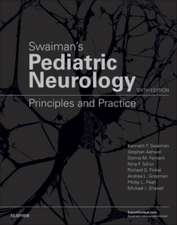X & y Chromosomal Variations: Colloquium Series on The Developing Brain
Autor Carole A. Samango-Sprouse, Andrea L. Gropmanen Limba Engleză Paperback – 30 sep 2016
| Toate formatele și edițiile | Preț | Express |
|---|---|---|
| Paperback (1) | 298.92 lei 6-8 săpt. | |
| MORGAN & CLAYPOOL PUBLISHERS – 30 sep 2016 | 298.92 lei 6-8 săpt. | |
| Hardback (1) | 433.84 lei 6-8 săpt. | |
| Morgan & Claypool Life Sciences – 11 oct 2016 | 433.84 lei 6-8 săpt. |
Preț: 298.92 lei
Preț vechi: 314.65 lei
-5% Nou
57.20€ • 59.72$ • 47.34£
Carte tipărită la comandă
Livrare economică 05-19 aprilie
Specificații
ISBN-10: 1615046909
Pagini: 138
Dimensiuni: 191 x 235 x 8 mm
Greutate: 0.25 kg
Editura: MORGAN & CLAYPOOL PUBLISHERS
Seria Colloquium Series on The Developing Brain
Notă biografică
Dr. Samango-Sprouse is an associate clinical professor of pediatrics at the George Washington University and is an Adjunct Associate Professor in the Department of Human and Molecular Genetics at Florida International University. Dr. Samango-Sprouse is currently the Director of the Neurodevelopmental Diagnostic Center for Children and the Executive Director and Chief Science Officer of The Focus Foundation.
She received her doctorate from George Washington University in Washington, DC and then studied neurobehavioral assessment at the Children's Hospital of Boston with Dr. Heidelise Als, a developmental psychologist and renown Harvard University scholar. She is trained in neuromotor and neurocognitive development, neurobehavioral skills and oral motor assessment for children with an emphasis on children with neurogenetic disorders. She is trained in Bobath neurodevelopmental training (NDT), and is certified in the assessment of pre-term infant behavior (APIB), the Brazelton Neonatal Assessment Scale (BNABS), and the Autism Diagnostic Observation Scale -2 (ADOS-2).
Dr. Samango-Sprouse's research focuses on the intersection between brain, behavior, and neurodevelopmental outcome in children with genetic disorders. She writes about the diverse and complex relationship between brain function secondary to genetic disorders and how to develop targeted treatment programs that optimize competency and recovery.
Dr. Samango-Sprouse has published more than 90 articles on children with neurogenetic disorders, published numerous chapters on the frontal lobe, 47, XXY, and computer-assisted evaluations for children with ASD. She has been guest editor of the American Journal of Medical Genetics, Part C and is on the Board of the Journal of Integrative Psychology and Therapeutics, the Editorial Board of BioMed Research International-pediatrics, and the Editorial Board of Advances in Endocrinology.
She is an invited grants reviewer for the March of Dimes, the International Rhett Syndrome Foundation (IRSF), Scientific Review Board, and Autism Speaks. She is an invited reviewer for Pediatrics, American Journal of Medical Genetics, Journal of Neuropsychology, Gene, Brain and Behavior, and Scientific Reports, among other scientific journals. In addition, she has had stories in the New Yorker, Washington Post, Psychology Today, and has been interviewed by NBC and Fox news.
Dr. Samango-Sprouse believes that a family-centered approach is critical to optimize a child's recovery. Parents must be empowered with information about their child's medical disorder, and how that condition will impact their child's learning and intellectual performance, she says. When parents are armed with the timely and accurate information, they can advocate for a syndrome-specific and targeted program to optimize recovery and produce an ideal outcome for the child and the family.




















